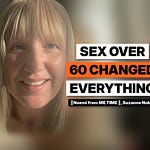SPEAKERS
Suzanne Noble, Peter Marriott
Suzanne Noble 00:10
Hello, and welcome to Sex Advice for Seniors, which, surprisingly, is coming to you from a different location today, isn't it Peter?
Peter Marriott 00:20
It is. We're broadcasting live from the John Radcliffe Hospital, here on hospital Radio 197. No, we're broadcasting from the hospital because I had a bit of a fall. Fell off my bike, and broke my ribs and my jaw. So I might sound a little strange while we're talking today. But we thought it'd be a good opportunity to talk about disability and sex because I also have another disability in that I have MS. So maybe there's the opportunity to do that. To talk about that.
Suzanne Noble 01:00
Well, I think if anytime is right, the time is now, you have to grab your opportunities when they arise. And if you hear some little background noise and squeaking that's just the lovely hospital ambience coming out to you. So, we can't do anything about that. So Pete had a bit of a fall. And he's laid up here in bed surrounded by three other older men who are looking in far worse condition than you do. Frankly, I have to say.
Peter Marriott 01:31
Well, they've got things like broken hips and stuff like that. They're really quite badly off. I think one's going for an operation today. Who knows? Who knows? Maybe I'll be released. But, nobody knows. We don't know.
Suzanne Noble 01:54
So let's talk about disability and sex. Because you know what, that's a really.. when it comes to taboo subjects. If you thought being older and having sex was taboo, well, just goes one level up, doesn't it when you've got a disability because it's something people really, really don't want to talk about at all, I suspect. But, you've had MS for how long now?
Peter Marriott 02:18
Oh, well, I was diagnosed in 2010. Retired in 2015. Early Retirement. So I've been hanging around thinking about these things for a while now. And disability and sex are a big one. Because, obviously, you know, all the issues we talked about last time were with self-identity, and being virile and strong and young and the rest of it kind of disappears if you have a disability. I mean, luckily for me, sexually, I don't seem to be too badly affected by the MS. So, but I know that for a lot of people is a big problem.
Suzanne Noble 03:11
And how does the illness for those of the audience that doesn't know how does it manifest itself?
Peter Marriott 03:20
Well, a million different ways. It starts off very small and it gets bigger and bigger. In my case, for some people, it never develops very far at all. A lot of people apparently find they have MS. Well, not them, obviously, their relatives, find that they have MS at the autopsy stage. The incidence is probably much higher, but it starts off with niggling pains and pins and needles and balance problems. Quite often sight problems, people go blind for no reason and then their sight comes back, back again. Those things happen and it takes quite a long time before they've discovered the reason for it because they don't really find out when they do an MRI scan and find you've got these lesions on your nerves, which is where the name comes from multiple sclerosis. You've lots of scar tissue on your nerves. And then they go from there and they offer you disease-modifying treatment and all sorts of things.
Suzanne Noble 04:46
And sexually, did you worry at first that it might have some impact on your sex life? When you first found out that you had MS. Was it something that you did think about or was it kind of pushed to the back in terms of some of the other challenges?
Peter Marriott 05:08
It seemed it wasn't having too much of an effect. So you prioritise in your head, the different things that are going on. I was more worried, for example at the time that I couldn't play the guitar anymore. I couldn't walk very far anymore. And that distance gradually declined and that was more worrying. But I guess if I'd had sexual problems, then that would have been pretty well at the top of the list, I should imagine. And luckily, I didn't, so I could concentrate on those other things.
Suzanne Noble 05:51
I suppose the only area is things around as you said, things around your balance, and also just general energy level. And I think that there are a lot of illnesses around that clearly impact people's energy levels. And you have to figure out positions and things where you're not expending as much energy. And the other person maybe takes over from that.
Peter Marriott 06:16
So whatever happens, then, your sex life is gonna change in lots of ways. , the energy is, is a major problem. Because you have to work really hard to keep your energy levels up. , you know, if you're gonna be fit, maintain your energy levels for sexual purposes then you have to get out and get exercising, you know, and that's the last thing you start running around or jumping up and down. You just want to lie down and take it easy. It affects you in lots of ways. And I think disabilities do that.
You're affected by not only your own disabilities, your own inability to, you know, have a full sex life, whatever. But you're affected by other people's perceptions of, more importantly, I, again, I don't, that hasn't been too bad for me, because apart from falling around a lot when people just assume I'm drunk, which sometimes I'm sometimes or not, but if you're in a wheelchair, or you have a more visible disability than I think it's much more of a problem. I think then, you know, you really are up against it, in terms of your sex life, or your or whatever you're doing really.
But that it's I think it's a big problem for your sex life if you're severely disabled. Obviously. But, but it's something where people think I will, the sex life is not important. There are more important things. And that's true. But it is such an essential part of being an adult human being that it's quite difficult to, put it aside and say, it doesn't matter. It's more important to be able to walk or, you know, do this, that and the other. I mean, the only reason I play the guitar, for example, is because originally I thought would be a good way to get laid. And so not being able to play the guitar is kind of synonymous with not getting laid. Realistically, there it is.
Suzanne Noble 09:14
That's such a male thing, isn't it? Like a rock star and thinking of associating it with getting laid? By whatever sex you happen to prefer? I suspect that, as you say, one of the, one of the key challenges I suspect of being somebody who's not got some form of disability, whether it's visible or invisible, is that the medical profession prefers not to think about sex, when it comes to all of this sort of stuff. So as you said, they tend to kind of go, well, let's talk about that. After we talk about all the other stuff. Let's get around to that later and getting around to that later, sometimes, that's the only thing you have to cling on to is the fact that actually, you know, you can have sexual pleasure you can be with someone, you can enjoy it.
If you're not able to do some other things, like, for instance, walk very far or you know, or go running or do whatever else people do to get endorphins going throughout their body, then that's one of the few things that you actually can do. And I think to dismiss it as being some are less important than some of these other things is to undermine just how important it is for adults, just in general.
I've seen that having been with partners who, you know, were diagnosed with cancer and asked the doctor for Viagra. One of the first things in a previous relationship, somebody I was with, who was diagnosed with late-stage cancer said, Well, can I just have some Viagra please so I can just have some fun for the last few months. And honestly, the doctor's face, his jaw fell to the floor. He could not have been, he didn't know what to do. He didn't know how to react. And he did say, let's think about that in a few weeks’ time. Let's just see how you get on after he has just been diagnosed with a death sentence. And he said, What are you talking about? There's no kind of getting on later on. I just want this now.
And the unfortunate thing was, I mean, we did go and find it from some backstreet place, this was pre being able to just pick it up at Boots. But I'll never forget how his attitude towards that request was somehow really surprising to me because I thought he couldn't be the only person that just wants to have sex towards the end of his life. I know, it's a morbid thing to talk about. But it did. It was really important to him. And if you...
Peter Marriott 11:56
If you said to people, you know, you've got 10 minutes to live, what you do, there's always some variation of sex in there. Some, not a very nice version of what they want to do, but, but somewhere there, and John Baetjemen was, you know, he was even in TV, TV ad, I think, at some point. And the end of his life is in a wheelchair and somebody asks him Do you have any regrets at all? You see, I wish I'd have more sex, you know, so, it's such ingrained parts of the human psyche to want that and to see that as an important part of our lives. And, you know, one of the first things the doctor did, in fact, I think it was the first appointment. My doctor offered me a prescription for Viagra. I think I still have them.
Suzanne Noble 13:07
And, and one of the things I was thinking about as well was that when people talk about pleasure, they often talk about orgasms. And many people, obviously, people who have got more severe disabilities and you have, or perhaps paralysed downstairs or whatever, or, you know, that might be something they're not able to achieve anymore. And I think we've got to stop associating pleasure being solely around orgasms. Because one of the things just jokingly, when, when I was talking to the other Pete the other day, we were, we were talking about, you know, how long it takes to have an orgasm when you're older, in other words, forever.
And he said, Oh, I've just, you know, and I just, I just, it just takes so long, I just get bored with myself, you know? And, and that's because, and I said, and I laughed because we all recognise that feeling when sometimes you just think, Oh, I just, I just can't be bothered. It's just taking far too long. And that could be because you're on medication, which makes it take much longer than usual, like antidepressants, for instance, or other types of medication made, which may also have some impact on the ability to orgasm.
But what I've come to realise is that actually, there's just so many different ways to get pleasure, and that having that one aim in mind that one goal is so limiting, and can be quite soul destroying sometimes when you just say, Oh, I just don't know if it's gonna happen, you know, but I've stopped thinking about whether it's gonna happen or not. And I kind of like the fact that I'm not bound so much by this desire anymore. to just get to this finish line, because the journey is as fun as getting to the finish line. And sometimes you're not gonna get to the finish line
Peter Marriott 15:08
I think that is an insight that by definition comes late in life I went to a mid-life crisis tantric workshop. And about the only thing, I learned from that was stop chasing the orgasm. You know, if you have an orgasm fine, it's great. But that's not the point. The point is to have fun along the way to be in tune with your IChing or whatever. However you want to see it. The point is the pleasure, the pleasure, the sex and stop chasing the orgasm. Simple as that really, especially if your orgasm is retreating ahead of you at a rate of knots. And, you know, sort of looking at the watch and thinking for Christ's sake Come on. That's no way to enjoy yourself.
And you've got to stop thinking that you're a failure if you don't have an orgasm. I think women have pretended to have orgasms since the beginning of time. Eve was probably there in the, in the, in the Garden of Eden giving it some welly and pretending to have an orgasm. But I'm not saying the men, because that's a bit more difficult. But, you know, just enjoy the sensations you get. I mean, I don't know about other men, but I get little orgasms, sort of mini orgasms while I'm having sex if I'm having a really good time. That's, you know, I think at the end of the session, then we might ask, Well, you didn't come? Are you happy? And you say good, happy? Great, fine, thanks very much. Good night.
Suzanne Noble 17:16
Well, that's all linked to this, again, this fear of failure, if you don't get to the end, that you somehow failed in some way on both sides. If men haven't, quote, unquote, given somebody an orgasm is if you can give it to them like a gift. Oh, here you go. Like, here's your orgasm or women have, you know, or if the guy's not coming, women often think, well, there's something wrong with me, obviously, I'm not very good at this.
And in fact, Pete, the other Pete said, Well, clearly you don't care whether they come. I said I don't really, I mean, I said, No, of course, I do a little bit, but I don't. I don't I'm not fixated on it. Because I know that. If it wasn't fun, then you'd want to stop. You would want to stop now. So, I think that there are many different ways to enjoy yourself. And I think that's really the whole thing about disability and having sex is that there are many, many different ways to enjoy yourself. And being fixated on penetrative sex, or whatever it just is, is only one very small part of the menu. That delightful menu that is, you know, that is sex and pleasure. And, and exploring all of that is where the joy comes in, and the hope and the openness towards being able to explore all the other erogenous zones, rather than the very predictable ones that we're all very familiar with.
Peter Marriott 18:43
So I have a couple of friends, who are, he's disabled and can't get an erection. But she says she's having the best sex she's ever had in her life. Because, you know, they're taking the time. , to make it work, you know, and different things and experimenting more, rather than just shoving it and off you go It's actually taking retirement to make sex, something enjoyable and pleasurable. Whatever it is, and that, you know, I think that's the message of the podcast so far as to do that. Take the pleasure where you can
Suzanne Noble 19:32
Yep, take the pleasure where you can you've been in the hospital. I'm in the hospital. Well, I don't know how that's going to work because there's a bit of a catheter issue at the moment. Not that may be too much information there for you guys. Anyway, that's, that's probably the one and only hopefully, episode of Sex Advice for Seniors. Brought to you from the John Radcliffe Hospital in the trauma ward, there you go. And if you know what nobody is going to be nobody else is going to be recording a podcast in this place. Certainly not in this ward.
Peter Marriott 22:00
Lots of people have been traumatised by us. Okay, all right, Off we go then. Bye-bye bye-bye.














